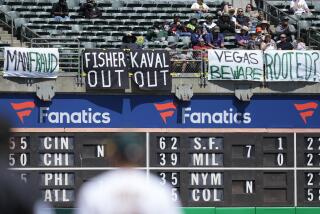NFL owners opt out
- Share via
ATLANTA -- NFL owners voted unanimously Tuesday to shorten their collective bargaining agreement with the players’ union.
That doesn’t mean a work stoppage is in the offing -- that would come three seasons from now in the absence of a new deal. But what it does mean is that the 2010 season will be played without a salary cap if the sides cannot reach an agreement before then.
NFL Commissioner Roger Goodell said the vote was “a very clear signal that the ownership doesn’t believe this deal is working, and it’s important for us all to sit down at the table and try to address the matters that aren’t working for the ownership.”
Gene Upshaw, executive director of the NFL Players Assn., said he wasn’t surprised by the owners opting out and believes the league did so for three main reasons: clubs feel they’re being penalized for new stadiums, the absence of a rookie wage structure, and the ability of underperforming players to keep their bonuses.
A look at some of the issues surrounding the deal gone bad:
--
Real estate realities
Those glistening new stadiums aren’t cheap, and owners say they’re spending so much on players that they’re having a hard time paying off their palaces. The players counter that they helped pay for those new and renovated venues by allowing the league to keep some of its premium-seat revenue to offset refurbishing costs, most recently in Carolina, Baltimore and Atlanta. The owners say the players are reaping the benefits of higher revenue generated by new stadiums without taking the risk of shouldering that debt.
--
One more for the road (or home)
Among the potential solutions the league is considering is shortening the exhibition season from four games to three and adding a 17th regular-season game. That would generate more TV revenue, which would benefit both sides, and help the league take care of its preseason problem of meaningless games featuring players who won’t even make the final roster.
So how would the league balance a team’s home/away schedule with an odd number of games? Goodell said one solution would be to give AFC teams an extra home game one season, and NFC teams an extra home game the next.
--
Show me the money
Upshaw said the union isn’t going to take on face value that team owners are in “dire straits,” and that players might look differently at the situation if they got a chance to look at the audited books of teams.
Goodell countered that the league recently offered to show the NFLPA more detailed financial information, but backed off that offer after the union put “unreasonable” conditions on that process. The commissioner said owners never called their situation dire, adding: “We are willing to make our case of why the deal isn’t working for us, but it has to be done properly.”
--
Youth is served
None of the owners is happy about astronomical rookie salaries. (Michigan tackle Jake Long, for instance, signed a five-year, $57-million deal last month when Miami made him the No. 1 pick.)
Although there are already some pay restrictions in place, the league would like to further limit how much teams pay newcomers who have never played a down.
--
Money-back guarantee
One of the things the Michael Vick case taught teams is they need a more effective method of recovering bonus money if a player fails to perform -- or, as in the case of Atlanta’s quarterback, is behind bars.
Upshaw said the union will never soften its position on this and ask players to give back money they have already earned.
--
Caps off to them
So what will it mean if the sides don’t strike a new deal over the next two seasons? That there will be no salary cap in 2010. But, if it gets that far, it won’t necessarily be the wild, wild West when it comes to teams signing players.
There are several rules in place that would limit the ability of notoriously free-spending teams -- Washington, Dallas, New England and others -- to snap up the best players.
First, a player would have to have six seasons under his belt to be eligible for free agency, two more seasons than the current requirement.
There would be additional restrictions on the top eight playoff teams from the previous season. Those teams would be able to add free agents only at the rate they lost them.
And third, whereas a team now can protect one star player by using either a franchise or transition designation, an uncapped year would allow teams to have both a franchise player and transition player.
--
Tale of two cities
It’s the union’s contention that part of the reason team owners are unhappy with the deal is their own revenue-sharing structure. “They hate paying the players,” Upshaw said, “But they hate paying and sharing with each other even more.”
Goodell said that’s a false premise.
“We share more revenue than any other sports league,” he said. “I think this is an issue about the labor costs, not about revenue sharing.”
--
L.A. story
Developer Ed Roski has proposed building a state-of-the-art stadium in City of Industry, but could the specter of labor unrest affect that? Goodell thinks it could.
“Uncertainty is never a great thing, and you have that,” the commissioner said. “So that could affect the potential for us to get a team in Los Angeles. It could affect the potential for additional revenue streams through television. So it can have that impact. I hope it won’t because I hope we’re able to reach that agreement. But there is that potential.”
--
More to Read
Go beyond the scoreboard
Get the latest on L.A.'s teams in the daily Sports Report newsletter.
You may occasionally receive promotional content from the Los Angeles Times.











